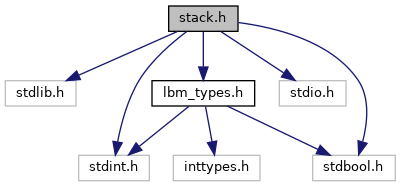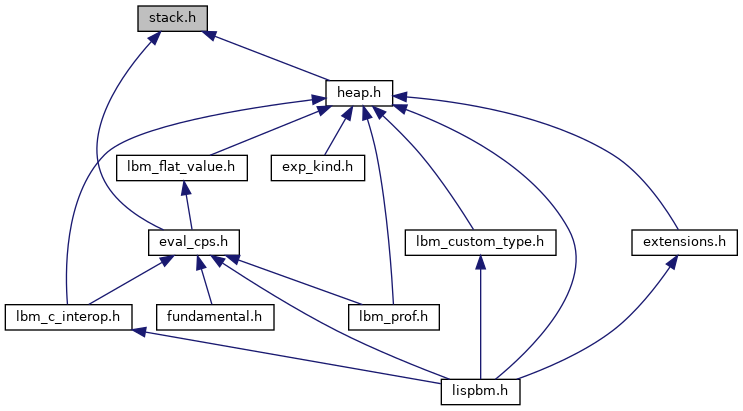#include <stdlib.h>#include <stdint.h>#include <stdbool.h>#include <stdio.h>#include "lbm_types.h"
Include dependency graph for stack.h:

This graph shows which files directly or indirectly include this file:

Go to the source code of this file.
Data Structures | |
| struct | lbm_stack_t |
Functions | |
| int | lbm_stack_allocate (lbm_stack_t *s, lbm_uint stack_size) |
| int | lbm_stack_create (lbm_stack_t *s, lbm_uint *data, lbm_uint size) |
| void | lbm_stack_free (lbm_stack_t *s) |
| void | lbm_stack_clear (lbm_stack_t *s) |
| lbm_uint * | lbm_get_stack_ptr (lbm_stack_t *s, lbm_uint n) |
| int | lbm_stack_drop (lbm_stack_t *s, lbm_uint n) |
| lbm_uint * | lbm_stack_reserve (lbm_stack_t *s, lbm_uint n) |
| int | lbm_push (lbm_stack_t *s, lbm_uint val) |
| int | lbm_pop (lbm_stack_t *s, lbm_uint *val) |
| static int | lbm_stack_is_empty (lbm_stack_t *s) |
| int | lbm_push_2 (lbm_stack_t *s, lbm_uint val0, lbm_uint val1) |
| int | lbm_pop_2 (lbm_stack_t *s, lbm_uint *r0, lbm_uint *r1) |
| int | lbm_pop_3 (lbm_stack_t *s, lbm_uint *r0, lbm_uint *r1, lbm_uint *r2) |
Function Documentation
◆ lbm_get_stack_ptr()
| lbm_uint* lbm_get_stack_ptr | ( | lbm_stack_t * | s, |
| lbm_uint | n | ||
| ) |
Get a pointer to the nth element (from the top) of a stack.
- Parameters
-
s Stack. n Index.
- Returns
- Pointer into the stack or NULL.
◆ lbm_pop()
| int lbm_pop | ( | lbm_stack_t * | s, |
| lbm_uint * | val | ||
| ) |
Pop a value from a stack.
- Parameters
-
s Stack to pop a value from. val Pointer to an lbm_value to store the pop:ed value int.
- Returns
- 1 on success and 0 on failure (stack is empty).
◆ lbm_pop_2()
| int lbm_pop_2 | ( | lbm_stack_t * | s, |
| lbm_uint * | r0, | ||
| lbm_uint * | r1 | ||
| ) |
Pop 2 values from a stack.
- Parameters
-
s Stack to pop values from. r0 Pointer to lbm_value where the first pop:ed value will be stored. r1 Pointer to lbm_value where the seconds pop:ed value will be stored.
- Returns
- 1 on success and 0 on failure (stack is empty).
◆ lbm_pop_3()
| int lbm_pop_3 | ( | lbm_stack_t * | s, |
| lbm_uint * | r0, | ||
| lbm_uint * | r1, | ||
| lbm_uint * | r2 | ||
| ) |
Pop 3 values from a stack.
- Parameters
-
s Stack to pop values from. r0 r1 r2
- Returns
- 1 on success and 0 on failure (stack is empty).
◆ lbm_push()
| int lbm_push | ( | lbm_stack_t * | s, |
| lbm_uint | val | ||
| ) |
Push an element onto a stack.
- Parameters
-
s Stack to push a value onto. val Value to push to the stack.
- Returns
- 1 on success and 0 on failure (stack is full).
◆ lbm_push_2()
| int lbm_push_2 | ( | lbm_stack_t * | s, |
| lbm_uint | val0, | ||
| lbm_uint | val1 | ||
| ) |
Push 2 values to a stack.
- Parameters
-
s Stack to push values onto. val0 Is pushed first. val1 Is pushed last.
- Returns
- 1 on success and 0 on failure (stack is full).
◆ lbm_stack_allocate()
| int lbm_stack_allocate | ( | lbm_stack_t * | s, |
| lbm_uint | stack_size | ||
| ) |
Allocate a stack on the symbols and arrays memory. lbm_memory_init must have been run before this function or it will fail.
- Parameters
-
s Pointer to an lbm_stack_t to initialize. stack_size Size in 32 bit words of stack to allocate.
- Returns
- 1 on success and 0 on failure.
◆ lbm_stack_clear()
| void lbm_stack_clear | ( | lbm_stack_t * | s | ) |
Sets the stack SP to 0.
- Parameters
-
s Stack to clear.
◆ lbm_stack_create()
| int lbm_stack_create | ( | lbm_stack_t * | s, |
| lbm_uint * | data, | ||
| lbm_uint | size | ||
| ) |
Create a stack in a statically allocated array.
- Parameters
-
s Pointer to an lbm_stack_t to initialize. data Pointer to array of 32 bit words to use as the stack storage. size Size in number of 32 bit words.
- Returns
- 1
◆ lbm_stack_drop()
| int lbm_stack_drop | ( | lbm_stack_t * | s, |
| lbm_uint | n | ||
| ) |
Drop n elements (from the top) of a stack.
- Parameters
-
s Stack to drop elements from. n Number of elements to drop.
- Returns
- 1 on Success and 0 on failure.
◆ lbm_stack_free()
| void lbm_stack_free | ( | lbm_stack_t * | s | ) |
Free a stack allocated on the lispbm_memory.
- Parameters
-
s Pointer to lbm_stack_t to free.
◆ lbm_stack_is_empty()
|
inlinestatic |
Check if a stack is empty.
- Parameters
-
s Stack to check.
- Returns
- 1 if stack is empty otherwise 0.
◆ lbm_stack_reserve()
| lbm_uint* lbm_stack_reserve | ( | lbm_stack_t * | s, |
| lbm_uint | n | ||
| ) |
Reserve place for n elements on the stack and move the stack pointer to the new top.
- Parameters
-
s Stack to reserve values on n Number of values to reserve
- Returns
- Pointer into stack position of reserver value 0 or NULL on failure